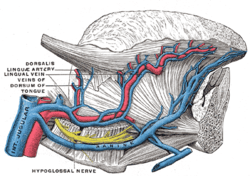Lingual veins
The lingual veins begin on the dorsum, sides, and under surface of the tongue, and, passing backward along the course of the lingual artery, end in the internal jugular vein.
| Lingual veins | |
|---|---|
 Veins of the tongue. (Lingual vein labeled at left.) | |
| Details | |
| Drains from | Tongue |
| Drains to | Internal jugular vein |
| Artery | Lingual artery |
| Identifiers | |
| Latin | Vena lingualis |
| TA | A12.3.05.009 |
| FMA | 14326 |
| Anatomical terminology | |
The vena comitans of the hypoglossal nerve (ranine vein), a branch of considerable size, begins below the tip of the tongue, and may join the lingual; generally, however, it passes backward on the hyoglossus, and joins the common facial.
The lingual veins are important clinically as they are capable of rapid absorption of drugs; for this reason, nitroglycerin is given under the tongue to patients suspected of having angina pectoris.
Tributaries
- Sublingual vein
- Deep lingual vein
- Dorsal lingual veins
- Suprahyoid vein
gollark: 1. string.dump function2. get and serialize locals3. get and serialize function environment4. get and serialize metatable
gollark: I think you could maybe make "perfect" serialization with `debug` (please enable that, someone) and lots of meddling.
gollark: It's not perfect (no preservation of external local variables) but kind of works.
gollark: `string.dump`…
gollark: We should switch to an iron-backed currency.
External links
References
This article incorporates text in the public domain from page 648 of the 20th edition of Gray's Anatomy (1918)
- Moore NA and Roy W. Rapid Review: Gross Anatomy. Elsevier, 2010.
This article is issued from Wikipedia. The text is licensed under Creative Commons - Attribution - Sharealike. Additional terms may apply for the media files.